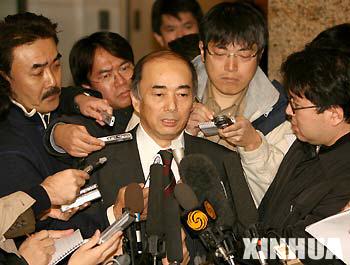
Kenichiro Sasae, Japan's chief negotiator in the
six-party talks, is interviewed by reporters in Beijing, yesterday. During his
stay in Beijing, Kenichiro Sasae is scheduled to meet his Chinese counterpart to
discuss restarting the six-party talks which focus on denuclearizing the Korean
Peninsula, grouping China, the Democratic People's Republic of Korea (DPRK), the
Republic of Korea (ROK), the United States, Japan and Russia.
-Xinhua
Kenichiro Sasae, Japan's top negotiator in the six-party talks, which aims to
resolve the nuclear issue on the Korean Peninsula, arrived in Beijing yesterday
evening.
Kenichiro Sasae, head of Japanese Foreign Ministry's Asian and Oceanian
Affairs Bureau, told the press at a hotel in Beijing that he would meet Wu
Dawei, vice foreign minister of China and the Chinese chief negotiator in the
six-party talks, to discuss issues related to the six-party talks including the
abduction issue.
The six-party talks, focusing on denuclearizing the Korean Peninsula, group
China, the Democratic People's Republic of Korea (DPRK), the Republic of Korea
(ROK), the United States, Russia and Japan.
The multilateral negotiations broke down in November last year triggered by
U.S. financial sanctions aimed at the DPRK's alleged money laundering and
counterfeiting.
The DPRK stunned the world on Oct. 9 this year by conducting its first
underground nuclear test, prompting international condemnation, but it agreed
last month to rejoin the nuclear disarmament talks. No fixed date has been set
yet.
The DPRK's Vice Foreign Minister Kim Kye Gwan, the country's chief delegate
to the six-party talks, may also visit Beijing, but the possibility of bilateral
talks of Japan and the DPRK on this occasion remained slim, Kyodo said.
At the hotel, Sasae denied any agenda or arrangements so far for meeting with
Kim or for any other multilateral meetings.
Sasae said he would also meet with Hu Zhengyue, head of the Chinese Foreign
Ministry's Asian Affairs Department, to discuss future Japan-China relations and
how to implement the consensus reached by the top leaders of the two countries
during their meeting in Beijing in October and their meeting in Hanoi in
November respectively.



